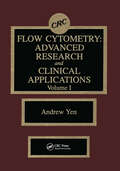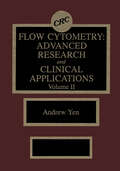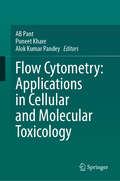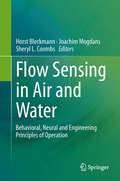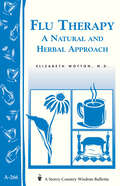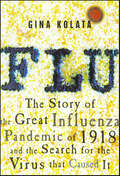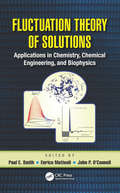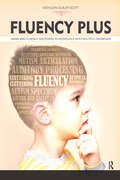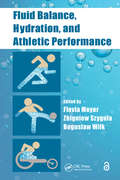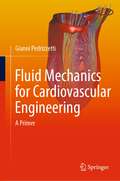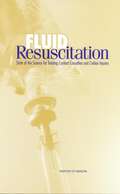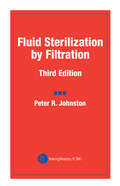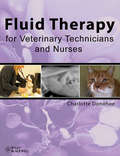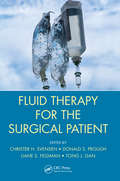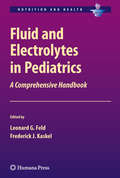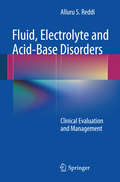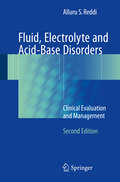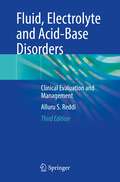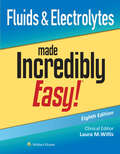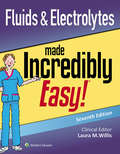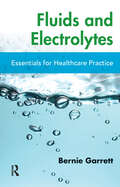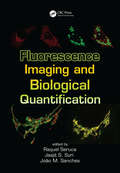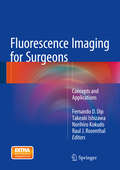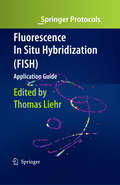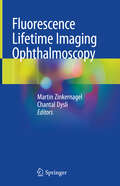- Table View
- List View
Flow Cytometry: Advanced Research and Clinical Applications, Volume I
by Andrew YenThe current technology and its applications in flow cytometry are presented in this comprehensive reference work. Described in explicit detail are the instrumentation and its components, and applications of the technology in cell biology, immunology, pharmacology, genetics, hematology and clinical medicine. Methods for data analysis, including both hardware and software, and explicit experimental techniques for making specific measurements are presented.Material is divided by topic into two volumes: Volume I covers instrumentation, genetics, and cell structure; Volume II contains material on cell function studies by flow cytometry.This reference is essential for both the novice and the experienced investigator using flow cytometry in research, and for students of cell biology, biomedical engineering, and medical technology.
Flow Cytometry: Advanced Research and Clinical Applications, Volume II
by Andrew YenThe current technology and its applications in flow cytometry are presented in this comprehensive reference work. Described in explicit detail are the instrumentation and its components, and applications of the technology in cell biology, immunology, pharmacology, genetics, hematology and clinical medicine. Methods for data analysis, including both hardware and software, and explicit experimental techniques for making specific measurements are presented.Material is divided by topic into two volumes: Volume I covers instrumentation, genetics, and cell structure; Volume II contains material on cell function studies by flow cytometry.This reference is essential for both the novice and the experienced investigator using flow cytometry in research, and for students of cell biology, biomedical engineering, and medical technology.
Flow Cytometry: Applications in Cellular and Molecular Toxicology
by Ab Pant Puneet Khare Alok Kumar PandeyThe book explores the role of flow cytometry in varied fields, from clinical diagnosis to toxicology. This comprehensive book offers insights into biomarkers, cellular analysis, and safety evaluations. Organized into fifteen chapters, this book explores flowcytometry's historical journey, scientific validation, and implementation in toxicity studies with case studies, technical and applied approaches, pictorial representations, informative tables, and simple language, It will be an invaluable resource for researchers, academia, biopharma industries, graduate and postgraduate students, Ph.D., and post-doctoral fellows working in the fields of toxicology/biosafety, and biomedical research.
Flow Sensing in Air and Water
by Horst Bleckmann Joachim Mogdans Sheryl L. CoombsIn this book, leading scientists in the fields of sensory biology, neuroscience, physics and engineering explore the basic operational principles and behavioral uses of flow sensing in animals and how they might be applied to engineering applications such as autonomous control of underwater or aerial vehicles. Although humans possess no flow-sensing abilities, countless aquatic (e. g. fish, cephalopods and seals), terrestrial (e. g. crickets and spiders) and aerial (e. g. bats) animals have flow sensing abilities that underlie remarkable behavioral feats. These include the ability to follow silent hydrodynamic trails long after the trailblazer has left the scene, to form hydrodynamic images of their environment in total darkness, and to swim or fly efficiently and effortlessly in the face of destabilizing currents and winds.
Flu Therapy: (A Storey Country Wisdom Bulletin A-266) (Storey Country Wisdom Bulletin Ser.)
by Elizabeth Wotton N.D.Since 1973, Storey's Country Wisdom Bulletins have offered practical, hands-on instructions designed to help readers master dozens of country living skills quickly and easily. There are now more than 170 titles in this series, and their remarkable popularity reflects the common desire of country and city dwellers alike to cultivate personal independence in everyday life.
Flu: The Story of the Great Influenza Pandemic of 1918 and the Search for the Virus That Caused It
by Gina KolataVeteran journalist Gina Kolata's Flu: The Story of the Great Influenza Pandemic of 1918 and the Search for the Virus That Caused It presents a fascinating look at true story of the world's deadliest disease.In 1918, the Great Flu Epidemic felled the young and healthy virtually overnight. An estimated forty million people died as the epidemic raged. Children were left orphaned and families were devastated. As many American soldiers were killed by the 1918 flu as were killed in battle during World War I. And no area of the globe was safe. Eskimos living in remote outposts in the frozen tundra were sickened and killed by the flu in such numbers that entire villages were wiped out.Scientists have recently rediscovered shards of the flu virus frozen in Alaska and preserved in scraps of tissue in a government warehouse. Gina Kolata, an acclaimed reporter for The New York Times, unravels the mystery of this lethal virus with the high drama of a great adventure story. Delving into the history of the flu and previous epidemics, detailing the science and the latest understanding of this mortal disease, Kolata addresses the prospects for a great epidemic recurring, and, most important, what can be done to prevent it.
Fluctuation Theory of Solutions: Applications in Chemistry, Chemical Engineering, and Biophysics
by Paul E. Smith Enrico Matteoli John P. O’ConnellThere are essentially two theories of solutions that can be considered exact: the McMillan-Mayer theory and Fluctuation Solution Theory (FST). The first is mostly limited to solutes at low concentrations, while FST has no such issue. It is an exact theory that can be applied to any stable solution regardless of the number of components and their co
Fluency Plus: Managing Fluency Disorders in Individuals With Multiple Diagnoses
by Kathleen Scaler ScottFluency disorders such as stuttering, cluttering, and atypical disfluency are often accompanied by concomitant speech and language disorders, as well as other disorders impacting and interacting with fluency. Despite this common presentation, there is little training for speech-language pathologists to confidently treat fluency disorders and concomitant disorders together. Fluency Plus: Managing Fluency Disorders in Individuals with Multiple Diagnoses fills this much-needed gap, providing a strong research base along with practical strategies and treatment activities to guide speech-language pathologists in managing clients with fluency and concomitant disorders.Dr. Kathleen Scaler Scott brings her years of clinical experience and her research in the areas of stuttering, cluttering and atypical disfluencies to Fluency Plus, designing it to act as both a textbook for students and a practical guide for the clinician. The comprehensive review of current definitions of fluency disorders and the evidence base for treatments will be of great help to students, while clinicians will appreciate the specific guidelines, strategies, and activities for managing fluency in concomitant disorders.After reviewing general principles and covering how executive functions relate to the management of these multiple concerns, the text addresses seven concomitant disorder areas the speech-language pathologist may encounter in practice. For each disorder category, an overview of potential fluency problems is provided, myths regarding treatment of fluency disorders in each population are debunked, and effective treatment activities are recommended.Some Concomitant Disorders Covered: Intellectual Disability Speech Sound Disorders (apraxia, phonological, articulation disorders) Learning Disabilities, Auditory Processing and Language Disorders Attention Deficit Hyperactivity Disorder Autism Spectrum Disorder Selective Mutism Fluency Plus: Managing Fluency Disorders in Individuals with Multiple Diagnoses helps close an education and training gap for students and clinicians alike by increasing their confidence, knowledge, and skills when dealing with fluency disorders and complex combinations of concomitant disorders.
Fluid Balance, Hydration, and Athletic Performance
by Flavia MeyerAthletes and nonathletes frequently consume too little water or fluids, affecting exercise performance as well as overall health. This book comprehensively reviews the aspects relating to body fluid balance, rehydration, and physical exercise. It provides background on body water balance and turnover, topics related to electrolyte balance, and sweating as the basis for thermoregulatory and fluid homeostasis during exercise. In addition, chapters cover body water balance evaluation and regulation; cardiovascular and metabolic responses to fluid imbalance; effects of dehydration on aerobic power, muscle strength, and cognitive function; fluid intake timing; and optimal beverage selection.
Fluid Mechanics for Cardiovascular Engineering: A Primer
by Gianni PedrizzettiThis book provides a guiding thread between the distant fields of fluid mechanics and clinical cardiology. Well rooted in the science of fluid dynamics, it drives the reader across progressively more realistic scenarios up to the complexity of routine medical applications. Based on the author’s 25 years of collaborations with cardiologists, it helps engineers learn communicating with clinicians, yet maintaining the rigor of scientific disciplines. This book starts with a description of the fundamental elements of fluid dynamics in large blood vessels. This is achieved by introducing a rigorous physical background accompanied by examples applied to the circulation, and by presenting classic and recent results related to the application of fluid dynamics to the cardiovascular physiology. It then explores more advanced topics for a physics-based understanding of phenomena effectively encountered in clinical cardiology. It stands as an ideal learning resource for physicists and engineers working in cardiovascular fluid dynamics, industry engineers working on biomedical/cardiovascular technology, and students in bio-fluid dynamics. Written with a concise style, this textbook is accessible to a broad readership, including students, physical scientists and engineers, offering an entry point into this multi-disciplinary field. It includes key concepts exemplified by illustrations using cutting-edge imaging, references to modelling and measurement technologies, and includes unique original insights.
Fluid Resuscitation: State of the Science for Treating Combat Casualties and Civilian Injuries
by Institute of MedicineHistorically, 20% of all injured combatants die on the battlefield before they can be evacuated to a field hospital. Blood loss--hemorrhage--is the single major cause of death among those killed in action whose lives might otherwise be saved. Fluid resuscitation and the treatment of hypovolemia (the abnormally decreased volume of circulating fluid in the body) offer the greatest opportunity for reducing mortality and morbidity associated with battlefield casualties.In Fluid Resuscitation, a committee of experts assess current resuscitation fluids and protocols for the treatment of combat casualties and make recommendations for future research. Chapters focus on the pathophysiology of acute hemorrhagic shock, experience with and complications of fluid resuscitation, novel approaches to the treatment of shock, protocols of care at the site of injury, and future directions for research.The committee explicitly describes the similarities and differences between acute medical care during combat and civilian emergency trauma care. Fluid Resuscitation should help energize and focus research in both civilian and military emergency care and help save the lives of citizens and soldiers alike.
Fluid Sterilization by Filtration
by Peter R. JohnstonCompletely revised and updated, Fluid Sterilization by Filtration, Third Edition discusses the use of gas and fluid filtration systems in sterilization technology. Packed with information useful to both the novice and the expert, it includes line-drawing illustrations, filtration setups, and plots of math functions illustrating fluid flows through
Fluid Therapy for Veterinary Technicians and Nurses
by Charlotte DonohoeFluid Therapy for Veterinary Technicians and Nurses provides veterinary support staff with essential information on administering fluid therapy. Encompassing catheter placement, monitoring of intravenous fluid therapy, long-term fluid therapy, intravenous nutrition, equipment, and potential complications, the book supports the reader in obtaining and maintaining intravenous access, monitoring patient responses, and reacting to changes in the patient’s condition. With complete coverage of the principles and procedures, Fluid Therapy for Veterinary Technicians and Nurses offers both a solid grounding in the fundamentals and more advanced information for experienced technician. Designed for ease of use, each chapter begins with the basics, giving a thorough foundation of information, and then moves into more advanced information, with potential nursing concerns and complications highlighted within the text. A companion website offers images from the book in PowerPoint and review questions and answers for download at www.wiley.com/go/donohoenursing. Fluid Therapy for Veterinary Technicians and Nurses is a useful resource for experienced veterinary technicians and vet tech students alike.
Fluid Therapy for the Surgical Patient
by Liane Feldman Christer H. Svensen Donald S. Prough T. J. GanOver the past decade, there have been a large number of important studies related to fluid management for the surgical patient, resulting in confusion on this critical aspect of patient care. Proper fluid therapy in the perioperative setting has always been important but has only recently had concrete outcome-based guidelines. This is the first comprehensive, up-to-date and practical summary book on the topic.
Fluid and Electrolytes in Pediatrics
by Leonard G. Feld Frederick J. KaskelOne of the time-honored foundations of the practice of pediatric medicine is the understanding and application of the principles of fluid, electrolyte and acid-base disorders. Presented in a new softcover format, Fluid and Electrolytes in Pediatrics: A Comprehensive Handbook brings together a select group of authors who share a passion and an appreciation of the contributions of pioneers in pediatric medicine and an expertise for their respective areas in a new softcover edition. The volume provides in-depth discussions of the basic functioning of the kidneys, skin and the lungs. Each chapter describes the etiology and demographics, biological mechanisms, patient presentation characteristics, therapy options and consequences of optimal treatment as well as delayed treatment. Fluid and Electrolytes in Pediatrics: A Comprehensive Handbook provides health professionals in many areas of research and practice with the most up-to-date, accessible, and well referenced volume on the importance of the maintenance of fluid and electrolyte concentrations in the pediatric population, especially under acute care.
Fluid, Electrolyte and Acid-Base Disorders
by Alluru S. ReddiFluid, Electrolyte and Acid-Base Disorders: Clinical Evaluation & Management is a clear and concise presentation of the fundamentals of fluid, electrolyte and acid-base disorders frequently encountered in clinical practice. Each chapter begins with pertinent basic physiology followed by its clinical disorder. Cases for each fluid, electrolyte and acid-base disorder are discussed with answers. In addition, board-type questions with explanations are provided for each clinical disorder to increase the knowledge for the clinician. Practical and clinically oriented, this book is a handy reference for practicing physicians, students, residents and fellows.
Fluid, Electrolyte and Acid-Base Disorders
by Alluru S. ReddiFluid, Electrolyte and Acid-Base Disorders: Clinical Evaluation & Management is a clear and concise presentation of the fundamentals of fluid, electrolyte and acid-base disorders frequently encountered in clinical practice. Each chapter begins with pertinent basic physiology followed by its clinical disorder. Cases for each fluid, electrolyte and acid-base disorder are discussed with answers. In addition, board-type questions with explanations are provided for each clinical disorder to increase the knowledge for the clinician. Practical and clinically oriented, this book is a handy reference for practicing physicians, students, residents and fellows.
Fluid, Electrolyte and Acid-Base Disorders: Clinical Evaluation and Management
by Alluru S. ReddiThis updated edition provides a clear and concise understanding of the fundamentals of fluid, electrolyte and acid-base disorders that are frequently encountered in clinical practice. Each chapter follows a standard format that begins with pertinent basic physiology followed by its clinical disorder. Cases for each fluid, electrolyte and acid-base disorder are discussed, along with board-type questions with explanations to increase clinicians' knowledge. Revised with new developments in the field, this edition's expanded chapters cover useful information left out of other textbooks.This practical, current, and clinically oriented book is a must-have reference for practicing physicians, students, residents and fellows.
Fluids & Electrolytes Made Incredibly Easy!
by LwwWritten in the enjoyable Incredibly Easy® style, Fluids & Electrolytes Made Incredibly Easy!®, 8th Edition, delivers step-by-step direction on balancing fluids and electrolytes, understanding fluid imbalances and the disorders that cause them, treating imbalances, and more. Ample patient care examples clarify real-world applications to give you essential support throughout your nursing career—in class, on the unit, in preparation for the NCLEX®, or as a refresher for clinical practice.
Fluids & Electrolytes Made Incredibly Easy! (Incredibly Easy! Series®)
by Laura WillisFor expert, confidence-building guidance on handling fluids and electrolytes, turn to the irreplaceable quick-reference guide Fluids & Electrolytes Made Incredibly Easy!®, 7th Edition. Written in the enjoyable Incredibly Easy!® style, it offers step-by-step direction on balancing fluids and electrolytes, understanding fluid imbalances and the disorders that cause them, treating imbalances and more. This real-world guide supports students and new nurses in class, on the unit and with NCLEX® preparation, while also serving as a solid refresher for experienced nurses.
Fluids and Electrolytes: Essentials for Healthcare Practice
by Bernard M. GarrettFluids and Electrolytes: Essentials for Healthcare Practice is designed to give a solid understanding of fluid and electrolyte physiology and its implications for practice, including acid-base balance and intravenous (IV) therapy, in a concise and easily understandable format. Chapters incorporate physiological, developmental and practical aspects, highlighting some of the key issues that arise from childhood to old age. This accessible text is presented with clear graphical representations of key processes, numerous tables and contains interesting facts to explore some common myths about human fluid and electrolyte physiology. A valuable resource for healthcare students, this book also provides a strong comprehensive overview for practitioners, nurses, physiotherapists and paramedics.
Fluorescence Imaging and Biological Quantification
by Jasjit Suri Raquel Seruca J. SanchesThis comprehensive reference work details the latest developments in fluorescence imaging and related biological quantification. It explores the most recent techniques in this imaging technology through the utilization and incorporation of quantification analysis which makes this book unique. It also covers super resolution microscopy with the introduction of 3D imaging and high resolution fluorescence. Many of the chapter authors are world class experts in this medical imaging technology.
Fluorescence Imaging for Surgeons
by Raul J. Rosenthal Fernando D. Dip Takeaki Ishizawa Norihiro KokudoThis text presents the experiences of leading researchers and surgeons with different fluorescence methods. Chapters range from basic science of fluorescence to current clinical applications and new horizons. The first few chapters describe the historical evolution and physical principles of fluorescence and provide the foundation for the reader to understand the current scope and limits of its use in surgery. The second section focuses on the clinical applications of intraoperative fluorescence imaging including subsections on fluorescence cholangiography, applications to hepatectomy, lymph node navigation, applications to GI tract and pelvic surgery and identification of cancer tissues. The third section focuses on new frontiers including fluorescence probes, imaging systems and applications to photodynamic therapy. Authored by leaders in the development of fluorescent methods worldwide, Fluorescence Imaging for Surgeons: Concepts and Applications will have an impact on numerous medical specialists including general surgeons, colorectal and minimally-invasive surgeons and surgical oncologists. Researchers will find the book to be an invaluable resource on the latest advances in the utilization of nanoparticles and fluorescent probes.
Fluorescence In Situ Hybridization (FISH) - Application Guide
by Thomas LiehrThis FISH application guide provides an overview of the principles and the basic techniques of fluorescence in situ hybridization (FISH) and primed in situ hybridization (PRINS), which are successfully used to study many aspects of genomic behavior and alterations. In 36 chapters, contributed by international experts in their particular field, the nowadays multiple approaches and applications of the powerful techniques are presented and detailed protocols are given. Described here are methods using various cell types and tissues as well as different organisms, such as mammalians, insects, plants and microorganisms. Multicolor FISH procedures and special applications such as the characterization of marker chromosomes, breakpoints, cryptic aberrations, nuclear architecture and epigenetic changes, as well as (array-based) comparative genomic hybridization studies are presented. Overall, the technique of choice is introduced for single cell analysis in human genetics, microbiology, animal and plant sciences.
Fluorescence Lifetime Imaging Ophthalmoscopy
by Martin Zinkernagel Chantal DysliThis book focuses on the emerging non-invasive imaging technique of Fluorescence Lifetime Imaging Ophthalmoscopy (FLIO). FLIO reveals unique information on retinal diseases, ranging from age-related macular degeneration and vascular diseases to hereditary retinal dystrophies. Fluorescence lifetimes enable the evaluation of disease progression before irreversible structural changes occur. The image acquisition is suitable for diagnostic purposes and follow-up examinations to investigate the natural course of disease, and to monitor the effects of possible therapies. This book fills the gap between available literature and gives state-of-the-art guidance on the principles of the FLIO technique, image acquisition, and data analysis. Written by a team of expert leaders within this field, this book will be relevant for scientists and clinicians with an interest in ophthalmoscopy.
